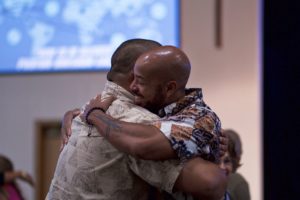What Every Person Wants
Author: Glenn ReynoldsWhat does every person want? Better living conditions? Civil rights? Somebody to love? A clean environment? A new car? Lower taxes and less government? A vacation? More? An endless supply of chocolate?

Most people want all of those, but what does every person in the world want? Jack Welch, former CEO of General Electric, thinks he has the answer. According to Welch, every person in the world wants voice and dignity. Not only do they want it, but they deserve it.
In his book Winning, Welch defines voice as “the ability to speak their minds and have their voice heard, regardless of their nationality, gender, age, or culture.”
By dignity, he means, “people inherently and instinctively want to be respected for their work and effort and individuality.”
When I first read Welch’s statement, my gut reaction was, “Well, duh. It doesn’t take a corporate giant to understand that people want others to hear them and recognize their work.”
Then I thought about my team of 25 or so employees and the nearly 1,000 volunteers who make this ministry work. I began to wonder how much voice and dignity I give them as their leader.
- How many times have I legislated change from the top down?
- How many times have I ignored the bottom of the ladder because I knew what was best for the organization?
- How many times have I discounted someone’s opinion because she was too young?
- How many times have I overlooked the efforts of other people because their job involved processes or tasks I do not find appealing?
That led me to ask myself, How can I do better at giving people a voice and dignity? Are there changes I need to make so people have voice and dignity?
MAKE PERFORMANCE REVIEWS AND GOAL SETTING A TWO-WAY STREET
Too often reviews are one-way conversations where the supervisor points out what is going well and what the employee needs to improve in his area of responsibility. Creating a dialogue by working with the employee to set goals for himself during the next review period creates a two-way conversation more about where the employee is headed and not just where he has been.
LISTEN MORE THAN YOU TALK
Joseph Ellis, a best-selling historian who focuses his interest on the American Revolution, asserts in his book, American Creation, that George Washington became a leader because he listened well. His calm demeanor and his ability to hold his tongue, while opening his mind to the opinions of others, earned him the respect and confidence of others. The old saying reminds us that we have two ears and one mouth so we can listen twice as much as we talk.
As a leader, my tendency can be to try to get people to understand what I am saying, where I am going, and how I want it done. In the rush to get this information across, I can be guilty of talking first and listening later — if at all. To give people voice and dignity, I need to slow down the communication process, close my mouth, and open my ears. In the end, slower can be faster. If I hear them earlier, I can save a great deal of headache later.

FOCUS YOUR AGENDA
Leaders have three primary tasks: evaluate, coach, and build self-confidence in their employees and volunteers. Through team meetings, one-on-one interactions, and team-development settings, I try to focus my agenda on evaluating, coaching, and building the confidence of my employees and volunteers.
Evaluating means making sure you have the right people on the team — and the right people in the right spots on the team. It means supporting, rewarding, and advancing people who are making a contribution to the team, and confronting and training those who are not. Evaluation is too important to be done once or twice a year in a formal setting. It must happen through every interaction with employees.
Coaching is about guiding, critiquing, and helping people perform their role to the best of their ability. It’s about helping people know how to look at their performance and critique it themselves — to ask the right questions and determine possible courses of action. One way to coach is to never let your team ask you essay questions. Essay questions are open-ended questions where you supply the essay answer. Make them ask you multiple-choice questions where they must offer you choices. Then, help coach them to the right answer.
Building self-confidence is about pouring out encouragement, care, and recognition. It is about energizing people and giving them the courage to stretch forward, take risks, and fulfill their dreams. Self-confidence is the fuel of winning teams. Self-confidence comes from making good decisions, choosing right options, and developing winning ideas.
CREATE FEEDBACK LOOPS
Feedback loops enable you to uncover doubt within your organization. Every organization — especially those engaged in significant change — has some level of doubt. Good leaders want to know the level of doubt in the organization so they can address it and keep the team moving forward toward the change goal. But often leaders do not want to hear about people’s doubts.
Take the political town hall meeting as an example. When a president or presidential candidate engages in a town hall meeting, the handlers make sure all of the attendees are on his side. They do not want any oddball or aggressive questions. They want softballs lobbed so their candidate can knock them out of the park. Leaders who engage in that type of feedback loop are trapped in a cul-de-sac of their own thinking.
Pastors can develop real feedback loops as they conduct congregational surveys, Internet surveys of first-time guests, 360-degree evaluations where employees evaluate the organization and their supervisor, as well as creating an atmosphere where we enable people to speak freely in appropriate settings.
Another way to create feedback loops is to formally and informally meet with key leaders and ask for their opinion. Ask them to help you improve the process. Let them know you cannot implement every idea, but let them know you value what they have to say. You may know more about where you want to go, but they know more about where you are right now as an organization.

ASK QUESTIONS OUTSIDE OF YOUR STRENGTH
As a leader, I am obsessed by mission, aims, and strategy — process does not interest me as much. That is not my strength. But, I have several employees who deal with process. If I do not ask questions about areas of ministry that do not interest me as much as strategy or creativity, then the message I send is that your ministry role is not valuable to me. But, if I ask questions about how the process works, about how the employee or volunteer accomplishes his task, I give that task dignity, and I give the employee or volunteer voice.
CELEBRATE WINS
One of the best ways you can start a meeting is by celebrating the wins. Let team members share a victory in their area of ministry since the last time you met. This builds confidence in them and in the vision. It also gives them voice and your response gives them dignity.
As a pastoral leader, I try to celebrate wins every Sunday by bringing up what has worked right in the previous week — whether it was an outreach project that had great results or a person who made a difference in someone’s life.
MAKE SURE YOU HAVE THEIR BACKS
Employees and volunteers need to be sure you have their best interest at heart — even when they are not in the room. They need to know you want what is best for them and not just what is best for the organization. That only happens as you build trust with employees or volunteers over time.
APOLOGIZE WHEN YOU MESS UP
You are not going to make the right call every time. You are not going to respond correctly to every issue. You will make mistakes. When you admit you are wrong and apologize to employees whom you have wounded or wronged, you give them dignity.
I am not perfect when it comes to giving people voice and dignity, but I want to do better. This is not an exhaustive list, but it is a starting point for me. It can be a good launching pad for you, too, as you seek to give those who follow you a voice and dignity.
